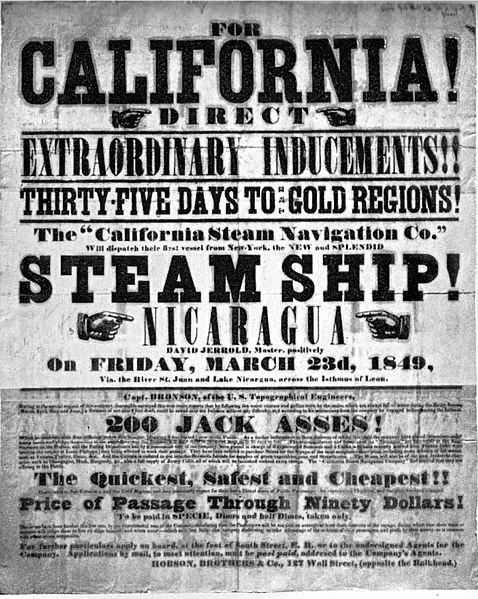
An early text ad
How sound is the concept of Adsense? Imagine what your elevator pictch for Adsense would be back in the day. Is it as useful as being able to buy books at bargain prices online or trading my used stuff with others? Well, I can only speak personally, but I have recieved little, if any value from Adsense. I've never found anything "relevant" to what I'm looking for in an Adsense ad. I've definitely tried, and I still don't understand it. When I search for something on Google the most relevant results are the natural search results. That is the justification of the search results--The ads inherently cannot be in the best interest of the user and I've trained up my mental adblocking circuits to just simply ignore them.
But, Google continues to milk money from Adsense, now up to $1.9 billion in this last quarter alone. Who's buying this stuff? I think the proper analogy is that Google is cashing in on the online Gold Rush it has created. It's selling picks and shovels to the miners when there is no gold in the mountains to be found. In the American Gold Rush, the real winners, at least financially, were the hotel owners and city developers that provided the support framework to the many westward bound migrants. Of the composition of Adsense traffic, I would conjecture that the majority are "mistake clicks" that do not lead to information the user actually wants to see. The design of the Adsense ad itself is optimized for these mistake clicks. For example if you hover over the Adsense ads on the right, you'll see that the entire surface of the ad is a clickable area, even the empty space between the ads. This goes counter to the web convention that only underlined, blue text represents a hyperlink. So the common behavior of underlining text as you read it will invoke the ad, causing the poor advertiser who thinks he has bid his money on a legitimate user to his site, to pay money to Google for the user's action.
In addition to these "mistake clicks" others have estimated that up to 20% of Adsense clicks are malicious clicks, or spam clicks. Google would never admit to this being a serious problem, but the advertisers themselves have noticed by examining their webserver logs that much of the traffic coming in from these Adsense clicks is suspicious.
So, there seems to be many misconceptions at multiple levels in the Adsense system, both between the user, Google, and the advertiser. How long can the parties involved remain in the dark? John Battelle, in a recent interview, said that this misconception persists because despite the false clicks, advertisers still believe that they are receiving some net benefit from Adsense, in terms of new users to their site. However, John thinks that there is some point at which these benefits will be outweighed by the costs of traffic acquisition.
Where will Google be when that point comes?
3 comments:
Who said that everything that's "sound" also has to be particularly useful? Just because people don't find it as useful as Amazon or EBay doesn't mean it's not a sound idea. Actually, the fact that they've managed to make so much money on an idea that people don't think is obviously useful is even more impressive than making money off of a commercially popular idea like an online store, don't you think?
And the fact that you're bashing Google publicly like this, does that mean that you're finally admitting you don't work for Google, despite having it in the title of your blog?
unblockable hover adshttp://www.hover-it.comGood judgement comes from experience and a lot of that comes from bad judgement ."W Rogers"unblockable hover ads
Where did you find it? Interesting read » » »
Post a Comment